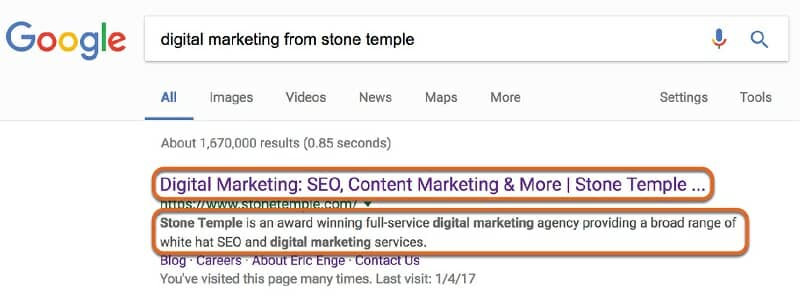Metadata is easy to ignore, but it actually can help your pages get more clicks.
In this episode of our Here’s Why digital marketing video series, Art of SEO lead author Eric Enge helps you understand metadata and why it matters for your SEO.
Don’t miss a single episode of Here’s Why. Click the subscribe button below to be notified via email each time a new video is published.
Resources
- The Value of Meta Information for SEO (And How to Use It)
- See all of our Here’s Why Videos | Subscribe to our YouTube Channel
Transcript
Mark: Eric, we’re talking about metadata today. So let’s start with the definition. What is metadata?
Eric: Metadata is information that’s kept in the HTML code of a webpage specifically for search engines to better understand what the page is about. But there’s also a human element, which I’ll discuss later. It consists of a title tag, a meta description, and a meta keywords tag.
Mark: All three are equally important for SEO?
Eric: Actually no, Mark. All the way back in 2009, Matt Cutts of Google confirmed that they don’t use the meta keywords tag for ranking purposes. So we actually can safely ignore it.
Mark: That leaves us with the title tag and the meta description.
Eric: Right, and those should be placed in the head section of an HTML page so they’re one of the first things a search engine finds when they look at the page.
Mark: What do search engines do with the title tag and meta description?
Eric: Aside from being basic clues to what the page is about, search engines may actually use either or both of those in the search result for that particular page, as you see here in this search result for our site’s homepage.

Mark: Why is that important?
Eric: First of all, Google uses the title tag in helping it rank your page for the right keywords. So the content you put in the title tag is incredibly important from a ranking perspective. And in addition, both the title tag and the meta description can increase your click-through rate, or your CTR as people call it, if they match the searcher’s intent better than other results in the page. And then more of them might actually click on your result even if it’s not at the top.
Mark: There are some good things you can accomplish with metadata, but are there ways to mess it up?
Eric: Sure. Many sites either completely ignore metadata or they misuse it, actually.
Mark: Misuse it? What do you mean?
Eric: If you don’t craft your title tag or meta description, Google will actually parse their own or create their own, and they may not be the optimum for your purposes.
Mark: But how could you misuse metadata?
Eric: The most common way is by lazily putting the same description on every page of your site or stuffing it with keywords or simply creating blah titles and descriptions that don’t do anything to entice people to click on the result.
Mark: Thanks, Eric. And folks, Eric has written a comprehensive guide to metadata for SEO that you can learn about it here. Now, in that post, he gives you nine rules for writing better title tags and six more rules for meta descriptions that really sell your page.
Don’t miss a single episode of Here’s Why. Click the subscribe button below to be notified via email each time a new video is published.
See all of our Here’s Why Videos | Subscribe to our YouTube Channel


Metadata is also considered while Google rank a page. Character limit must be maintained in writing Metadata.
Hello ERIC,
Great post. This is the well-known strategy for SEO and your blog post provides quite useful information about Metadata, Meta data is invisible to your visitor and customer. It lives and work behind the scenes in the HTML of Your WEB page and which is helpful for the spider to know about your website page.
Great Article Mate. Experimenting with meta title with awkward words and attention grabbing words have to increase CTR on my blogs.
I recommend everybody to hugely focus on implementing these things to gain some quick upward traffic.
Hello Eric and Mark.
Great video.
I have a one question.
Exemple:
If we have law company and we have landing page for Family Law.
Our structure at title tag must be:
Family law | Services | Our Example brand
or
We must use more relevant title tag?
Thanks
I’d try to write something that reads reasonable well to users. So something like:
“Family Law & Services From Our Example Brand”, just to make it more user friendly. To Google, there is probably no difference between your version and mine, but mine probably looks more appealing to most users.